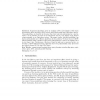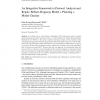495 search results - page 58 / 99 » Automata and differentiable words |
COLT
1994
Springer
13 years 12 months ago
1994
Springer
: Sequential algorithms given by Angluin 1987 and Schapire 1992 learn deterministic nite automata DFA exactly from Membership and Equivalence queries. These algorithms are feasible...
COLT
2006
Springer
13 years 11 months ago
2006
Springer
Given a finite set of words w1, . . . , wn independently drawn according to a fixed unknown distribution law P called a stochastic language, an usual goal in Grammatical Inference ...
FMSD
2007
13 years 7 months ago
2007
In the classical framework of formal languages, a refinement n is modeled by a substitution and an abstraction by an inverse substitution. These mechanisms have been widely studie...
INFORMATICALT
2007
13 years 7 months ago
2007
A modified version of the Bellare and Rogaway (1993) adversarial model is encoded using Asynchronous Product Automata (APA). A model checker tool, Simple Homomorphism Verificatio...
CORR
2011
Springer
12 years 11 months ago
2011
Springer
Complementation of finite automata on infinite words is not only a fundamental problem in automata theory, but also serves as a cornerstone for solving numerous decision problem...


